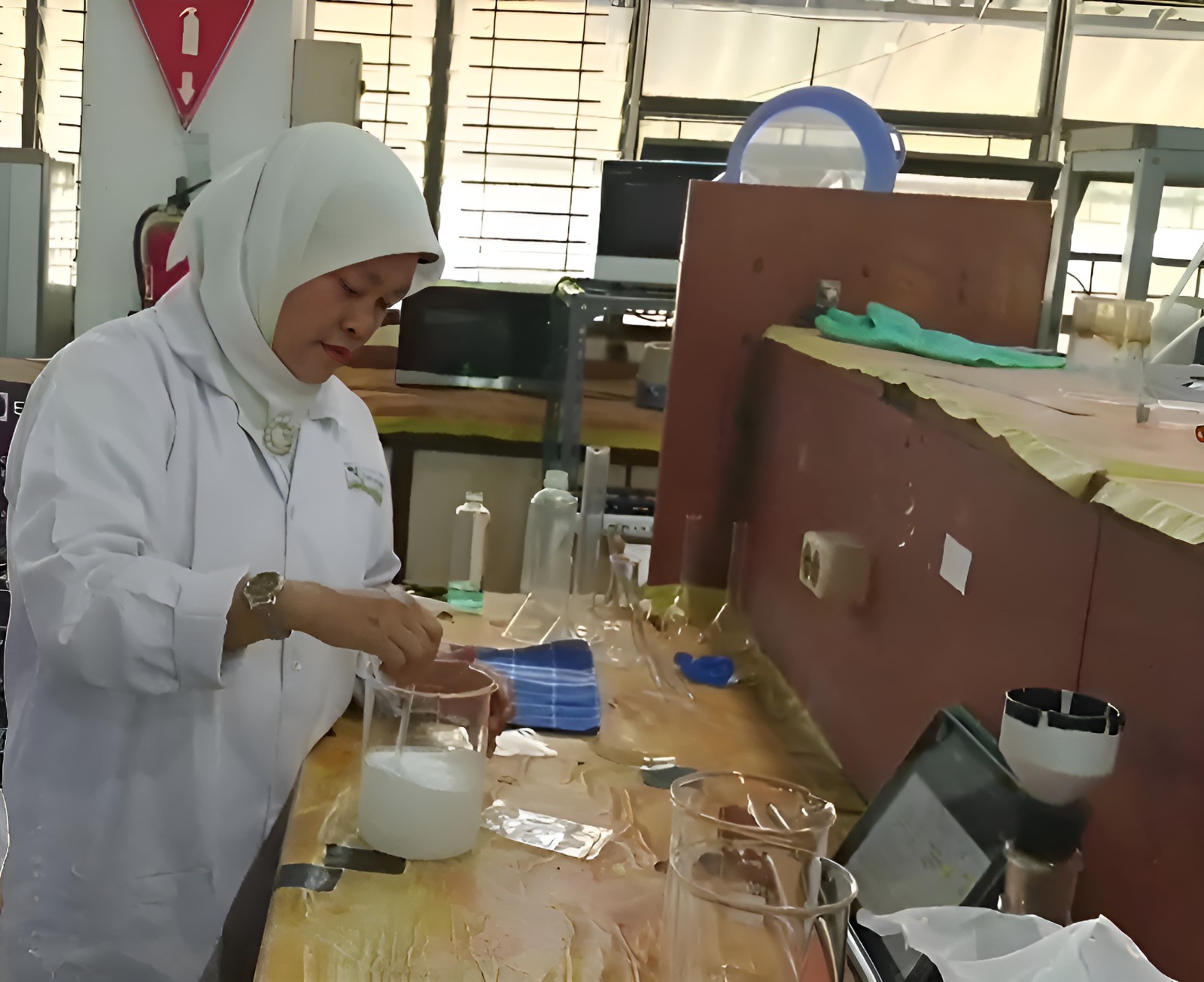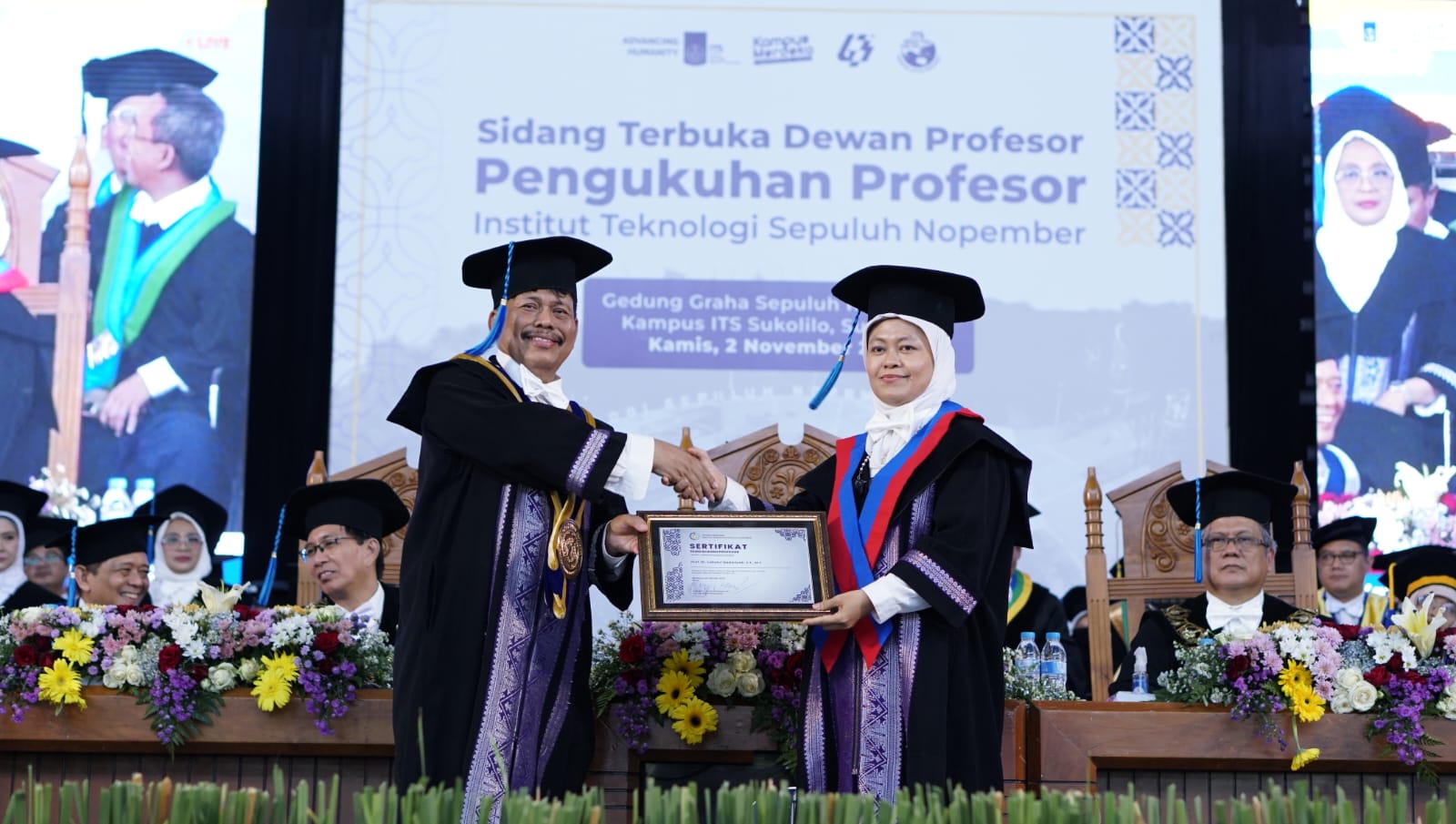Preventing Pollution, ITS Professor Develops Environmentally Friendly Surfactants

Prof Dr Ir Lailatul Qadariyah ST MT IPM when delivering his scientific oration regarding Environmentally Friendly Surfactants
ITS Campus, ITS News – The difficulty of the surfactant waste degradation process causes pollution which can damage the environment. To anticipate this happening again, Professor of Chemical Engineering at Institut Teknologi Sepuluh Nopember (ITS) Prof Dr Lailatul Qadariyah ST MT IPM developed an environmentally friendly surfactant made from vegetable ingredients.
The 171st ITS professor said that the surfactants currently circulating on the market still use basic ingredients from petroleum derivatives. This type of material cannot be renewed and used waste is difficult to decompose. To overcome this problem, the woman who is often called Arin came up with an alternative surfactant made from vegetable ingredients, namely palm oil.

Prof Dr Ir Lailatul Qadariyah ST MT IPM during the process of making the MES in the laboratory
Arin said that palm oil was chosen because of the abundant availability of raw material resources. Not only that, the high content of saturated fatty acids such as palmitic acid and oleic acid in palm oil also has a high potential for processing as a base for surfactants. “The type of surfactant developed in this research is Methyl Ester Sulfonate (MES),” added the woman who was born on September 18, 1976.
In her presentation, this mother of three explained that MES is an anionic surfactant that is used as an active ingredient in detergent products and to increase the effectiveness of petroleum drilling. MES is made by reacting palm oil and methanol. Then, to speed up the reaction, a base catalyst is added which then becomes methyl ester. “After that, the methyl ester is sulfonated to become MES,” explained Arin regarding the research he outlined in his inaugural scientific oration as a professor at ITS.

Graph of the first-order kinetics of the sulfonation reaction using microwave heating which is one of the novel methods in research by Prof Dr Ir Lailatul Qadariyah ST MT IPM from ITS
The 2015 Satya Lancana Apart from that, its detergency properties are also better than normal surfactants. The use of renewable materials also allows it to be produced more massively at lower costs. “This makes this surfactant very worthy of competing on the market,” he said optimistically.
Apart from the raw materials, Arin said that the novelty of the method varied in this research lies in the heating method which is different from ordinary conventional heating. The heating used in this research is heating using microwaves and ultrasonic waves. By varying the two methods, the results and heating time are shorter. “So production efficiency also increases,” said this ITS Chemical Engineering doctoral graduate.

Prof Dr. Ir Lailatul Qadariyah ST MT IPM when inaugurated as ITS’s 171st Professor at the Open Session of the ITS Professor Council
Closing her explanation, Ari Nursamsu’s wife said that in the future the development of this product will continue until it becomes a consumer product and can be commercialized. Lastly, Arin hopes that the research he has been working on for the past four years can contribute to environmental safety, community welfare, and the sustainability of the nation’s future. (ITS Public Relations)
Reporter: Shafa Annisa Ramadhani
Related News
-
Facilitating Creativity of Students, ITS Information Systems Department Presents CCWS
ITS Department of Information Systems students conduct a discussion in one of the available spaces in the ITS Digital
November 16, 2023 15:11 -
ITS Explores Electrification Cooperation with PT Vale Indonesia
ITS Campus, ITS News — Following up on the Memorandum of Understanding (MoU) with PT Vale Indonesia, Institut Teknologi
November 16, 2023 15:11 -
ITS Reaches Top 7 BRIN Collaborators with 309 Scientific Publications
ITS Campus, ITS News — Institut Teknologi Sepuluh Nopember (ITS) continues demonstrating its commitment to strengthening collaboration in research
November 16, 2023 15:11 -
The Only One from Indonesia, ITS Student Becomes Erasmus+ Scholarship Awardee
ITS Campus, ITS News — Civitas academica of Institut Teknologi Sepuluh Nopember (ITS) has once again contributed to making
November 16, 2023 15:11
